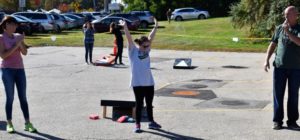Northborough Challenger program holds corn hole tournament
 Monday, October 21, 2019 at 8:40PM
Monday, October 21, 2019 at 8:40PM By Melanie Petrucci, Senior Community Reporter
 (l to r) Kate Lowe with Leah Toronto and Jim Furlong at the Northborough Challenger fundraiser
(l to r) Kate Lowe with Leah Toronto and Jim Furlong at the Northborough Challenger fundraiser
Photos/Melanie Petrucci
Northborough – Members of the Northborough Challenger program had a fantastic day Oct. 13 for their fifth annual Corn Hole Tournament fundraiser. Buoyed by fantastic weather and the lack of a Patriot’s football game, this year’s event scored big with a large crowd which was hosted by Texas BBQ on Main Street.
Forty teams had signed up for the tournament which was double elimination in format.
Former Challenger participant Leah Toronto sang the national anthem before the tournament began. Leah, 24, is now a coach with the Challenger Program.
Event Coordinator Kate Lowe explained that this was the only event to raise money for the Northborough Challenger program, a nonprofit program for kids ages 5 through 22 with physical or intellectual disabilities.
“The rest of the program is funded by the Mark Fidrych Foundation,” added Jim Furlong, Lowe’s husband and program co-coordinator.
Dave Brannon, owner of Texas BBQ, “makes a huge donation of all of the food and the alcohol. He donates all the profits back to the program,” Furlong added.
When asked why he supports the Challenger program, Brannon explained, “It’s a great cause … and it’s a good family event and you see a lot of kids here. We get a lot of our food donated so it all goes to the fund.”
“Today’s donations we are going to give back to the Mark Fidrych Foundation. The Mark Fidrych Foundation funds our program 100 percent, we call them on the phone and tell them what we need and the check is there…They are amazing,” Furlong noted.
The event was expected to raise between $3,000 and $4,000.
Community Advocate Oct 21, 2019

